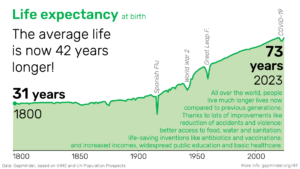
Let me begin with a self-statement.
I am 62 years old and feel as strong as when I was in my twenties. In most areas of activity (physical and intellectual), I exercise strength and agility. My workday typically starts at 4:00 a.m. and ends after 10: 00 p.m. Over the last thirty years, I have been blessed to have jobs (some which I create, and some created by others) which allow / require me to work at my own pace. I do not plan to “retire” from work, even though I will leave my current job at the specified retirement age. I plan to continue engaging in a variety of work-related activities and manage many projects. Most of my current areas of work are filled with fun and to neutralise those aspects which are not fun, I add fun activities to my week.
Life expectancy and the retirement age
In 1800 life expectancy was 31 years; in 1910 at birth it was only 50 years in the United States of America. Death through wars, diseases, famine, malnutrition, and natural disasters meant that few people lived beyond 50, as compared to later periods. In the USA, for example, the 1900 Census data showed that only 4% of the population was 65 and older. Fast-forward to 2025, looking at the Caribbean, the estimates are that by 2050, 25% of the population will be over 60 years old. With the level of chronic diseases, malnutrition, poor living conditions, and natural disasters which characterised the Caribbean, it is safe to assume that the percentage of people over 60 / 65, would be in the same 4% region as in the United States in the year 1900.


In 1910, life expectancy at birth was only 50 years in the United States of America. Death through wars, diseases, famine, malnutrition, and natural disasters meant that few people lived beyond 50, as compared to later periods.
According to a July 2025 article entitled “Retirement Changes Dramatically Over the Years”, by 1940, life expectancy had risen to 61, then 67 in 1970, and as of 2000, to 73.

Most Caribbean countries used age 60 as the retirement age up to recently. In Jamaica’s case, for example, it was not until 2018 that the retirement age was moved to 65. But several other countries (in Europe for example) had long been using age 65, which is perhaps why in moving up the retirement age, most countries used 65 as the benchmark, perhaps unmindful of the precedents. Germany, for example, had initially set age 70 as the retirement age in 1881, and it is suggested that this was because Otto von Bismarck, then Chancellor, was 74 and felt that a healthy person could comfortably work up to age 70. The age was lowered to 65 in 1916.
The key point to note is that the age of retirement was an arbitrary number set relative to life-expectancy.
The biology of maturity and the periods of highest productivity
Research published in the New England Journal of Medicine, shows that individuals between age 60 and 70 are at the peak of their productivity, closely followed by people 70 – 80, with third place going to people 50 – 60. I have many mentors, family members, and friends who are in their 70s and 80s and are as intellectually sharp as when I met or knew them thirty and forty years ago. These findings have profound implications for how countries manage their human resources and cater to the needs of their aging populations.

Research published in the New England Journal of Medicine, shows that individuals between age 60 and 70 are at the peak of their productivity, closely followed by people 70 – 80, with third place going to people 50 – 60.
Reimagining work and the workforce
One of the arguments often advanced for setting or keeping the retirement age at 60 / 65 is that these older employees need to move on / out to make way for younger employees. There is some merit to that argument, but the merit is more of a historical than a current one, in my opinion. In the new forms and structures of work, younger people are creating the own employment using social media, where some have become millionaires. There is also great expansion of the cultural and creative industries and the gig economy. These developments suggest that the traditional career paths no longer exist, and spending decades in the same organisation or same job is no longer an attractive or viable option. Young people value working for companies that are in alignment with their social, environmental and ethical beliefs. They are in favour of flexible work structures that include remote work options and hybrid models that give them greater control over their time. Gen Zs prioritise their well-being and expect that places of work will support their mental health. In terms of skill development, this demographic prefers continuous learning and diverse experiences and looks forward to work environments that nurture skill expansion and career growth. Transparency and communication are also important to Gen Zs and as such they are desirous of having clear and honest communication from employers.
In the new forms and structures of work, younger people are creating the own employment using social media, where some have become millionaires. There is also great expansion of the cultural and creative industries and the gig economy. These developments suggest that the traditional career paths no longer exist, and spending decades in the same organisation or same job is no longer an attractive or viable option.
It is instructive that in some fields, age 70 or higher is the retirement age, specifically the judiciary. In Barbados, judges retire at age 72, and in Grenada, Jamaica, and Trinidad & Tobago, they retire at age 70. What this practice suggests, given the research, is that the justice system of those countries, and by extension the society, utilise, to the fullest, the experience, erudition, and effectiveness during the most productive period of their lives.

It is to be noted that both in the judiciary and other fields in the United States of America, there is no retirement age.
This practice in the judiciary is one which may be adopted across the spectrum of the employment arena, and thus I propose that countries of the Caribbean consider raising the retirement age to 70 years.
References
Field, B. (2025, July 11). Retirement Changes Dramatically Over the Years. https://www.seniorliving.org/library/retirement-changes-dramatically-over-years/
LoBello, J. (2024, July 21). What is the most productive age ? https://scottysanders.com/what-is-the-most-productive-age
Social Security. (n.d.). Age 65 Retirement. https://www.ssa.gov/history/age65.html
Canute Thompson is Professor of Educational Policy, Planning and Leadership, Pro Vice-Chancellor – Undergraduate Studies and Director of the Caribbean Centre for Educational Planning at The University of the West Indies, a social activist, and author of eight books and twenty journal articles.
Professor Thompson has earned several awards. Among them, are eight UWI Principal’s Awards – two for Best Publication (Article Category) in 2019 and in 2020 for his book, ‘Reimagining Educational Leadership in the Caribbean’; three for Most Outstanding Researcher (2020, 2021, and 2024); two in 2023 on behalf of the CCEP – for Research Activity generating the most funds and Research with the most Development Impact, and one in 2024 for Research Activity generating the most funds. In 2022 he was awarded a bronze medal in the Independent Publishers’ Book Awards, for his 2020 book, Education and Development: Policy Imperatives for Jamaica and the Caribbean.
